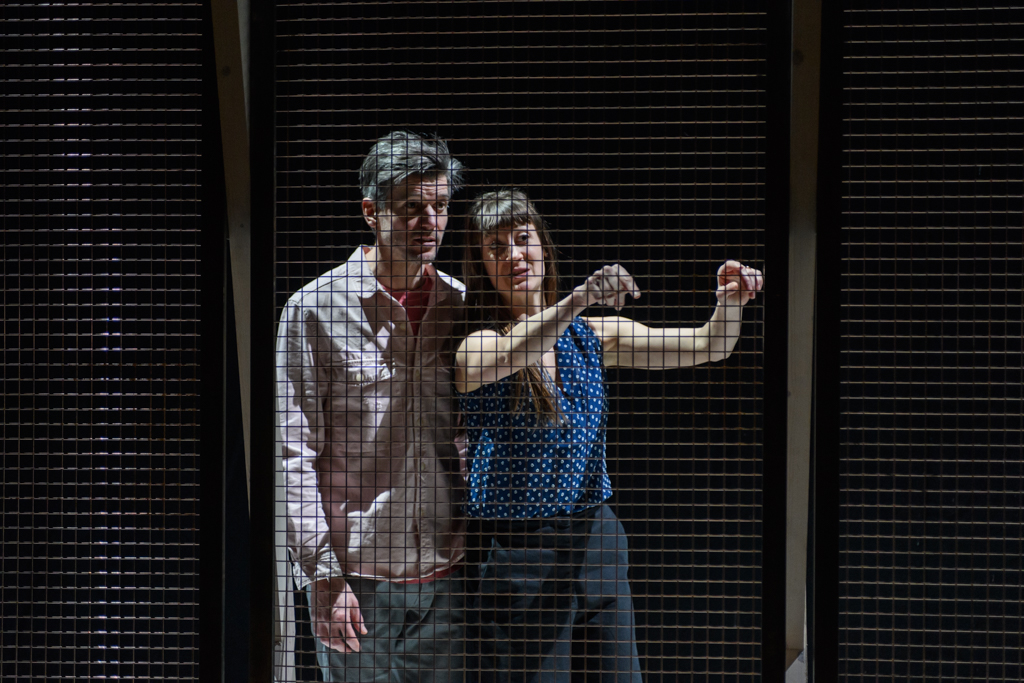Ben Duke’s Juliet and Romeo is a contemporary, theatrical rewriting of Shakespeare’s Romeo and Juliet. Duke rewrites their history so that the ‘star-crossed lovers’ do not, in fact, die in a tragic misunderstanding. Instead, they survive and 20 years on sit in a therapist’s office, confessing their failing relationship which includes their too high expectations of each other and problems in the bedroom. It is hugely refreshing, reassuring and hilarious.
Ben Duke, the creator and director of the performance, graduated with a first class degree in English Literature from Newcastle University and trained at Guildford School of Acting, the London Contemporary Dance School. His experience crashes together in this play which combines dialogue, movement and music.
Juliet (Solène Weinachter) and Romeo (Ben Duke) begin the play facing the audience, immediately involving us in some kind of intimate chat. Juliet says casually, “just stop me whenever because I have a thick French accent and Romeo… well he has a tendency to mumble”. The audience is unexpectedly addressed and cleverly put into the role of Juliet and Romeo’s therapist. The actors persistently break the fourth wall throughout the play, continuously fighting against its fictionality. Indeed, the text is self-conscious of itself, aware of its own fame and consequently the hundreds of different adaptations. Juliet dreams of Leonardo Di Caprio and the book of the play is physically on stage throughout so that the characters can never really escape Shakespeare’s original version or its inevitable tragedy. It creates a strange doubling of the characters so that fiction and reality become very blurred.
The metaphorical expressions of dance punctuate the text of the play. Each movement represents different emotions and experiences. As a part of their couples therapy, Juliet and Romeo re-enact their earliest memories of each other, resulting in hilarious misremembered sequences and hugely overdramatised first encounters.
Ultimately, life is a disappointment to both characters. It is not an infinitely romantic relationship which Shakespeare encapsulates by killing the characters at the height of their relationship. A much more real relationship is, instead, portrayed. Indeed, upon re-enacting their first encounter, Romeo moves towards Juliet in a physical and sexually driven performance whilst The Beatles song, ‘I want you’, plays and Juliet stands there rolling her eyes. It is both hilariously relatable and refreshing to see Romeo as a real person rather than this heroic, supposedly romantic Shakespearian character. Juliet’s memory of this is much more dramatic, like that of a fairytale. She dances balletically to Prokofiev’s ‘Romeo and Juliet’, performing their encounter with so much hope and intense emotion, reminiscent of the “star-cross’d lovers” that we know.
Despite their differing memories and their hilarious miscommunications, when they dance, the couple are harmonious. Their bodies are in sync. Their memories of their sexual desire for each other are evident in their physicality. The passion is palpable, unavoidable. Yet, when the music fades, the play very quickly returns to the awkward reality of tentative movement and Romeo’s lack of commitment.
Romeo’s absence from the relationship is evident. His regressions to childlike movement and inability to verbally express emotion are addressed repeatedly by Juliet and are clearly relatable to the audience. It is ironically and hilariously summed up with Simon and Garfunkel’s ‘Sound of Silence’, which plays when Romeo, predictably, has no answer for Juliet. Despite the obvious sombre tone of the song, after one beat, the audience are laughing out loud. But, like Shakespeare’s play, Juliet and Romeo is simultaneously comic and tragic. The play has incredible skill to instantly manoeuvre the atmosphere from laughter to heartbreak.
The music is especially powerful in doing this, where it is either ironic, clashing or completely truthful. Indeed, despite the upbeat nature of Frank Sinatra’s ‘That’s Life’, the audience sit there in absolute silence. Applying the lyrics to their relationship, it is an utterly devastating realisation of
the inevitability of Juliet and Romeo’s tragic fate. It is that feeling of disappointment, almost like being winded, completely stopping the laughter in its tracks.
Indeed, in the completely heart-breaking ending, Romeo moves backwards through their relationship, reversing the play, unwinding and erasing their history. Through a combination of movement and dialogue, he wishes away his life with Juliet. She is left on stage on her own, swaying to the slow, tragic lyrics of Cat Power’s ‘Wild is the Wind’: “love me, love me, say you do”. It is more tragic than Shakespeare’s ending. It is not a frustrating misunderstanding but a conscious decision from Romeo to walk away from the relationship.
Juliet and Romeo by Lost Dog was performed at the Riley Theatre at the Northern School of Contemporary Dance on 14 November 2018. Tickets are still available for performances across the UK.
Amy Lind Harrison
Image credit: lostdogdance.co.uk

